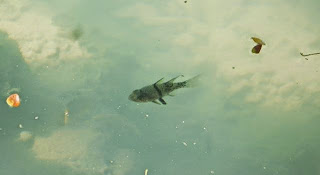Fiji log 3 -- 27 May 2015
 |
| mangrove blossoms |
 |
| We walked among and around mangroves |
We found some shells and wild lemons during our walk. Frances thought she left her room key with the things we collected, but when we came back, it wasn't there. We searched. We got Topher and Nico to help. They waded out in case the key fob had floated out. Finally, Nico decided it could not be in the water. He retraced our route and found it where Frances had slipped and fallen.
 |
| fish from the dock |
 |
| Fijian mother and child on the beach |
In the afternoon, we headed to the village of Narara. It was a rough bus ride, but oh so worth it. When we arrived, we were greeted by a group who sang a welcome song.
When the song was finished (I'll try to post it on Facebook), girls and women circulated, handing out little necklaces made of leaves and flowers. They squatted down and clapped four times when they had finished placing them around our necks. We were told that touching someone's head is quite rude. The lowering of their heads and clapping was an apology.
After that, we took off our hats. In a village, the chief is the only male who wears a hat. Wearing a hat in town is disrespectful. We were conducted to a central, open building. We took off our shoes and were seated in an arc around the kava bowl. The men and the chief's spokesman did the kava ceremony.
Evalone, our guide was selected to drink kava for us. But after that, two of each group were chosen to drink ceremonially. Two girls from New Zealand were with our group. Each got a drink. Then two men from our party and two women also did the ceremonial drinking. When the ceremonies were concluded, everyone was invited to taste the concoction.
Kava, when prepared, is a light tan liquid. It has a bland taste and is supposed to be an aid to relaxation. It is made from roots and bark. These are ground together by pounding in an iron mortar.
 |
| raw kava |
 |
| grinding kava (only men do this) |
 |
| ground kava |
When the ceremony and drinking were finished, we headed for the water slide. It was a tricky trail, lots of ups and downs and two water crossings. I slipped and fell a couple of times, but there was always a villager nearby to help me up. I have never met a nicer, more obliging folk. They treated me and Fran as if we were their grandparents.
The water slide looked like fun. Most of the group stripped to their bathing suits and rode it multiple times. Some of the village boys showed off for us. They jumped instead of slid. Several did creditable dives, including a forward summersault. When everyone had as much fun as they could stand, we headed back to Narara. The walk back was not as strenuous as the way to the slide. But the temperature had dropped to around 70ºF and the villagers were uncomfortably cool.
A delicious lemon tea was waiting for us. The girls and boys circulated with little sweets. In the same place as the kava ceremony, Narara had made a market for us.
 About 20 people had placed things they had made on mats. There was jewelry, sarongs (called sulu), carved wood and shells and just stuff. It was fun. If you bought something and needed change, the vendor asked around for it. If the bills were not there, someone went out to find the correct amount.
About 20 people had placed things they had made on mats. There was jewelry, sarongs (called sulu), carved wood and shells and just stuff. It was fun. If you bought something and needed change, the vendor asked around for it. If the bills were not there, someone went out to find the correct amount.
When we left, everyone who had helped us or talked to us lined up to shake hands.
We learned some more Fijian. So far we have
Bula = hello, welcome or whatever the situation indicates.
It is almost sung by the Fijians.
Yandra = good morning
Vinaca = thank you. This is almost sung with the 'vi' high and the rest lower
Due = knock knock. Actually knocking on a door is the equivalent of trespassing.
Ohe-due = come on in
One of the things we were told about the Fijian culture is that respect is very important. That is why men don't wear hats in a village, so that only the chief will be adorned. Also, if you come into a home or building where everyone is seated, you walk bowed slightly. That shows you do not consider yourself higher than those already present.




No comments:
Post a Comment